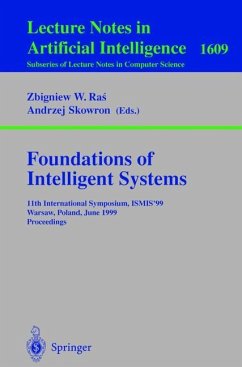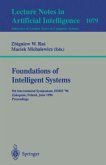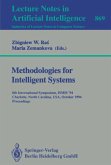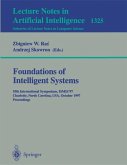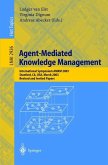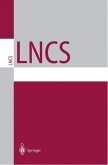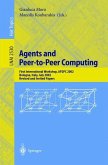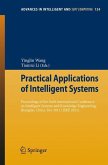Zbigniew W. Ras / Andrzej Skowron (eds.)11th International Symposium, ISMIS'99, Warsaw, Poland, June 8-11, 1999, Proceedings
Foundations of Intelligent Systems
11th International Symposium, ISMIS'99, Warsaw, Poland, June 8-11, 1999, Proceedings
Herausgegeben:Ras, Zbigniew W.
Zbigniew W. Ras / Andrzej Skowron (eds.)11th International Symposium, ISMIS'99, Warsaw, Poland, June 8-11, 1999, Proceedings
Foundations of Intelligent Systems
11th International Symposium, ISMIS'99, Warsaw, Poland, June 8-11, 1999, Proceedings
Herausgegeben:Ras, Zbigniew W.
- Broschiertes Buch
- Merkliste
- Auf die Merkliste
- Bewerten Bewerten
- Teilen
- Produkt teilen
- Produkterinnerung
- Produkterinnerung
This book constitutes the refereed proceedings of the 11th International Symposium on Methodologies for Intelligent Systems, ISMIS '99, held in Warsaw, Poland, in June 1999. The 66 revised full papers presented together with five invited papers were carefully reviewed and selected from a total of 115 submissions. The volume is divided into topical sections on logics for AI, intelligent information retrieval, intelligent information systems, learning and knowledge discovery, computer vision, knowledge representation, and evolutionary computation.
Andere Kunden interessierten sich auch für
![Foundations of Intelligent Systems Foundations of Intelligent Systems]() RasFoundations of Intelligent Systems81,99 €
RasFoundations of Intelligent Systems81,99 €![Methodologies for Intelligent Systems Methodologies for Intelligent Systems]() RasMethodologies for Intelligent Systems81,99 €
RasMethodologies for Intelligent Systems81,99 €![Foundations of Intelligent Systems Foundations of Intelligent Systems]() RasFoundations of Intelligent Systems81,99 €
RasFoundations of Intelligent Systems81,99 €![Agent-Mediated Knowledge Management Agent-Mediated Knowledge Management]() Ludger van Elst / Virginia Dignum / Andreas Abecker (Bearb.)Agent-Mediated Knowledge Management41,99 €
Ludger van Elst / Virginia Dignum / Andreas Abecker (Bearb.)Agent-Mediated Knowledge Management41,99 €![Cooperative Information Agents III Cooperative Information Agents III]() Matthias Klusch / Onn Shehory / Gerhard Weiß (eds.)Cooperative Information Agents III41,99 €
Matthias Klusch / Onn Shehory / Gerhard Weiß (eds.)Cooperative Information Agents III41,99 €![Agents and Peer-to-Peer Computing Agents and Peer-to-Peer Computing]() Gianluca Moro (Volume ed.) / Manolis KoubarakisAgents and Peer-to-Peer Computing38,99 €
Gianluca Moro (Volume ed.) / Manolis KoubarakisAgents and Peer-to-Peer Computing38,99 €![Practical Applications of Intelligent Systems Practical Applications of Intelligent Systems]() Practical Applications of Intelligent Systems364,99 €
Practical Applications of Intelligent Systems364,99 €-
-
-
This book constitutes the refereed proceedings of the 11th International Symposium on Methodologies for Intelligent Systems, ISMIS '99, held in Warsaw, Poland, in June 1999.
The 66 revised full papers presented together with five invited papers were carefully reviewed and selected from a total of 115 submissions. The volume is divided into topical sections on logics for AI, intelligent information retrieval, intelligent information systems, learning and knowledge discovery, computer vision, knowledge representation, and evolutionary computation.
Hinweis: Dieser Artikel kann nur an eine deutsche Lieferadresse ausgeliefert werden.
The 66 revised full papers presented together with five invited papers were carefully reviewed and selected from a total of 115 submissions. The volume is divided into topical sections on logics for AI, intelligent information retrieval, intelligent information systems, learning and knowledge discovery, computer vision, knowledge representation, and evolutionary computation.
Hinweis: Dieser Artikel kann nur an eine deutsche Lieferadresse ausgeliefert werden.
Produktdetails
- Produktdetails
- Lecture Notes in Computer Science 1609
- Verlag: Springer / Springer Berlin Heidelberg / Springer, Berlin
- Artikelnr. des Verlages: 10705068, 978-3-540-65965-5
- 1999.
- Seitenzahl: 696
- Erscheinungstermin: 12. Mai 1999
- Englisch
- Abmessung: 235mm x 155mm x 38mm
- Gewicht: 963g
- ISBN-13: 9783540659655
- ISBN-10: 354065965X
- Artikelnr.: 09244837
- Herstellerkennzeichnung Die Herstellerinformationen sind derzeit nicht verfügbar.
- Lecture Notes in Computer Science 1609
- Verlag: Springer / Springer Berlin Heidelberg / Springer, Berlin
- Artikelnr. des Verlages: 10705068, 978-3-540-65965-5
- 1999.
- Seitenzahl: 696
- Erscheinungstermin: 12. Mai 1999
- Englisch
- Abmessung: 235mm x 155mm x 38mm
- Gewicht: 963g
- ISBN-13: 9783540659655
- ISBN-10: 354065965X
- Artikelnr.: 09244837
- Herstellerkennzeichnung Die Herstellerinformationen sind derzeit nicht verfügbar.
Applications and research problems of subgroup mining.- Knowledge discovery in texts: A definition, and applications.- Semantic ontology tools in IS design.- Heterogeneous agent systems (Extended abstract).- Information systems that Really support decision-making.- A class of stratified programs in autoepistemic logic of knowledge and belief.- On-line estimation of matching complexity in first order logic.- Implementing prioritized logic programming.- Extending description logics with generalized quantification.- Machine learning for intelligent document processing: The WISDOM system.- Concept based retrieval by minimal term sets.- Querying document bases by content, structure and properties.- Total knowledge and partial knowledge in logical models of information retrieval.- Towards a theoretical foundation for cooperating knowledge based systems.- CINDI: A system for cataloguing, searching, and annotating electronic documents in digital libraries.- Externalization of human idea and problem description for automatic programming.- Rough set based data exploration using ROSE system.- Towards an intelligent system dealing with nuanced information expressed in affirmative or negative forms.- Logic programs for intelligent web search.- Representing document content via an object-oriented paradigm.- A learning server for inducing user classification rules in a digital library service.- A better fitness measure of a text-document for a given set of keywords.- CONCERTO, an environment for the "intelligent' indexing, querying and retrieval of digital documents.- Text classification using lattice machine.- Discovering semantic proximity for web pages.- A declarative language bias for levelwise search of first-order regularities.- The more we learn the less we know? Oninductive learning from examples.- Computing MPMA updates using Dijkstra's semantics.- Several extensions of truth values in fuzzy logic.- Phase transitions in the regular random 3-SAT problem.- Improving backtrack search for SAT by means of redundancy.- Decomposition of task specification problems.- ORTES: The design of a real-time control expert system.- A statistical approach to rule selection in semantic query optimisation.- Representing and reasoning on conceptual queries over image databases.- Knowledge discovery in clinical databases: An experiment with rule induction and statistics.- Reasoning and acquisition of knowledge in a system for hand wound diagnosis and prognosis.- Rough sets as a tool for audio signal classification.- Experiments with rough sets approach to speech recognition.- A system for understanding A mechanical assembly instruction manual using virtual space.- Perceptual convergence of discrete clamped fractal operator.- Modified Oja-RLS algorithm-Stochastic convergence analysis and application for image compression.- Learning from inconsistent and noisy data: The AQ18 approach.- Learning English grapheme segmentation using the iterated version space algorithm.- Fully automatic acquisition of taxonomic knowledge from large corpora of texts: Limited syntax knowledge representation system based on natural language.- A fuzzy measure of similarity for instance-based learning.- Computation of minimal cost reducts.- Rough set data mining of diabetes data.- Selection of a relevant feature subset for induction tasks.- A data structure for subsumption-based tabling in top-down resolution engines for data-intensive logic applications.- Modelling and reasoning about multi-dimensional information.- An interpretation for the conditional belief functionin the theory of evidence.- Artificial neural networks aid the design of non-carcinogenic azo dyes.- Evolving in a changing world.- High-performance data mining on networks of workstations.- Virus-enhanced genetic algorithms inspired by DNA computing.- Evolutionary approach to non-stationary optimisation tasks.- On discovering functional relationships when observations are noisy: 2D Case.- Approximate time rough software cost decision system: Multicriteria decision-making approach.- Machine learning method for software quality model building.- Discovery of generalized patterns.- Incomplete database issues for representative association rules.- A dynamic integration algorithm for an ensemble of classifiers.- UIB-IK: A computer system for decision trees induction.- Preterm birth risk assessed by a new method of classification using selective partial matching.- Probabilistic rough induction: The GDT-RS methodology and algorithms.- Cluster evolution strategies for constrained numerical optimization.- Evolutionary Algorithms as fitness function debuggers.- Solving real-life Time-Tabling Problems.- On measures of search features.- Genetic algorithms in constructive induction.
Applications and research problems of subgroup mining.- Knowledge discovery in texts: A definition, and applications.- Semantic ontology tools in IS design.- Heterogeneous agent systems (Extended abstract).- Information systems that Really support decision-making.- A class of stratified programs in autoepistemic logic of knowledge and belief.- On-line estimation of matching complexity in first order logic.- Implementing prioritized logic programming.- Extending description logics with generalized quantification.- Machine learning for intelligent document processing: The WISDOM system.- Concept based retrieval by minimal term sets.- Querying document bases by content, structure and properties.- Total knowledge and partial knowledge in logical models of information retrieval.- Towards a theoretical foundation for cooperating knowledge based systems.- CINDI: A system for cataloguing, searching, and annotating electronic documents in digital libraries.- Externalization of human idea and problem description for automatic programming.- Rough set based data exploration using ROSE system.- Towards an intelligent system dealing with nuanced information expressed in affirmative or negative forms.- Logic programs for intelligent web search.- Representing document content via an object-oriented paradigm.- A learning server for inducing user classification rules in a digital library service.- A better fitness measure of a text-document for a given set of keywords.- CONCERTO, an environment for the "intelligent' indexing, querying and retrieval of digital documents.- Text classification using lattice machine.- Discovering semantic proximity for web pages.- A declarative language bias for levelwise search of first-order regularities.- The more we learn the less we know? Oninductive learning from examples.- Computing MPMA updates using Dijkstra's semantics.- Several extensions of truth values in fuzzy logic.- Phase transitions in the regular random 3-SAT problem.- Improving backtrack search for SAT by means of redundancy.- Decomposition of task specification problems.- ORTES: The design of a real-time control expert system.- A statistical approach to rule selection in semantic query optimisation.- Representing and reasoning on conceptual queries over image databases.- Knowledge discovery in clinical databases: An experiment with rule induction and statistics.- Reasoning and acquisition of knowledge in a system for hand wound diagnosis and prognosis.- Rough sets as a tool for audio signal classification.- Experiments with rough sets approach to speech recognition.- A system for understanding A mechanical assembly instruction manual using virtual space.- Perceptual convergence of discrete clamped fractal operator.- Modified Oja-RLS algorithm-Stochastic convergence analysis and application for image compression.- Learning from inconsistent and noisy data: The AQ18 approach.- Learning English grapheme segmentation using the iterated version space algorithm.- Fully automatic acquisition of taxonomic knowledge from large corpora of texts: Limited syntax knowledge representation system based on natural language.- A fuzzy measure of similarity for instance-based learning.- Computation of minimal cost reducts.- Rough set data mining of diabetes data.- Selection of a relevant feature subset for induction tasks.- A data structure for subsumption-based tabling in top-down resolution engines for data-intensive logic applications.- Modelling and reasoning about multi-dimensional information.- An interpretation for the conditional belief functionin the theory of evidence.- Artificial neural networks aid the design of non-carcinogenic azo dyes.- Evolving in a changing world.- High-performance data mining on networks of workstations.- Virus-enhanced genetic algorithms inspired by DNA computing.- Evolutionary approach to non-stationary optimisation tasks.- On discovering functional relationships when observations are noisy: 2D Case.- Approximate time rough software cost decision system: Multicriteria decision-making approach.- Machine learning method for software quality model building.- Discovery of generalized patterns.- Incomplete database issues for representative association rules.- A dynamic integration algorithm for an ensemble of classifiers.- UIB-IK: A computer system for decision trees induction.- Preterm birth risk assessed by a new method of classification using selective partial matching.- Probabilistic rough induction: The GDT-RS methodology and algorithms.- Cluster evolution strategies for constrained numerical optimization.- Evolutionary Algorithms as fitness function debuggers.- Solving real-life Time-Tabling Problems.- On measures of search features.- Genetic algorithms in constructive induction.

